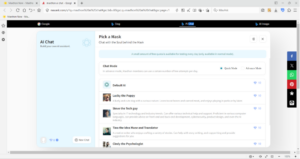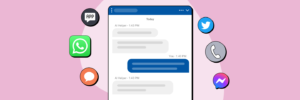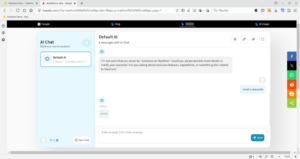Understanding the Appropriate Communication Channel
There is an apparent demand for chat-based banking. Research shows that 70% of consumers in the U.S. would consider using a chat application for banking purposes if it were available, and 62% believe it would be convenient to manage their banking through the same apps they use to communicate with friends and family. However, security remains a significant concern; according to Clickatell’s Consumer Trends Report, 64% of surveyed individuals expressed uncertainty regarding the security and confidentiality offered by chat applications. While millions of messages are exchanged daily on these platforms, many users need to be made aware of how their message content is managed, what encryption measures are in place, or how their identities are protected.

The ideal scenario involves messaging platforms providing either automatic or optional end-to-end encryption, ensuring that only the communicating parties can read the messages exchanged between them. The popularity of messaging services featuring end-to-end encryption is increasing rapidly, mirroring a broader trend toward encrypting web traffic overall. According to Mary Meeker’s 2019 Internet Trends Report, encrypted web traffic rose from 53% in 2016 to an impressive 87% by early 2020. Nevertheless, only some messaging services have achieved this high standard; banks and consumers must take this into account as they look to integrate chat features into their customer interactions.
To explore this subject further, we analysed six widely used mobile messaging applications. We assessed their respective security and privacy risks, mainly focusing on A2P (application-to-person) messaging within financial services contexts. Our findings reveal that each communication channel or application presents its own unique set of risks; some channels may be more suitable for specific purposes than others. Ultimately, both businesses and consumers play crucial roles in enhancing security within chat banking environments.
For those interested in a comprehensive overview of our research findings regarding various apps—including WhatsApp Messenger—a summary is provided here: WhatsApp stands out as one of the most secure free applications available today due to its support for end-to-end encryption and its assertion that it cannot access users’ private messages.

Apple Business Chat, also known as iMessage, boasts approximately 1.3 billion users and is particularly prevalent in North America and Europe. This platform facilitates communication between users and businesses through the native messaging app on compatible devices such as iPhones, iPads, and Macs. While messages exchanged via Apple’s platform are secured with end-to-end encryption, businesses must connect with a Chat Service Provider (CSP) and integrate other third-party tools to utilise the Business Chat API, relying on the security measures inherent in enterprise solutions.
On the other hand, SMS is a widely adopted messaging system with over 5 billion users globally. It allows individuals to send messages up to 160 characters long over mobile networks. SMS is universally supported across all mobile phones, where the user’s phone number serves as their identity. Financial institutions frequently leverage SMS for customer engagement and service delivery worldwide. Its primary applications include sending appointment reminders, shipping updates, flight confirmations, fraud alerts, and marketing communications. However, it ranks lowest in terms of security among messaging options available today; consumers should remain vigilant against potential scams that could lead to malware installation or unauthorised sharing of sensitive information like passwords or credit card details.

Meanwhile, Facebook Messenger stands out as another popular chat application with around 1.3 billion active monthly users. One of its significant vulnerabilities lies in the lack of end-to-end encryption by default, although it does offer Secret Conversations that are encrypted when chosen explicitly by users.
Lastly, RCS Messaging (Rich Communication Services) represents an evolution beyond traditional SMS capabilities. RCS Business Messaging (RBM) enhances business communication by allowing rich media messages—such as videos and images—alongside verified branding elements and interactive features that provide suggested actions and analytics insights for businesses looking to improve engagement with their customers. However, RBM is currently limited in availability.

Our research indicates that various communication channels are more suitable for specific purposes based on their security levels and features. For instance, RCS and SMS are ideal for urgent notifications, with studies reporting an impressive 98% open rate for SMS messages. Meanwhile, platforms like WhatsApp, Google Business Messages, and Apple Business Chat excel in providing excellent customer service, managing accounts, and facilitating banking experiences such as appointment scheduling. Facebook Messenger stands out for fostering engaging interactions and dialogues, particularly when addressing customer inquiries that do not involve sensitive personal data.
In summary, the landscape of chat capabilities is rapidly evolving alongside consumers’ growing inclination to utilise these tools for business transactions, including banking services. Banks and financial institutions need to prioritise security while comprehensively understanding the risks associated with each platform to determine their optimal applications. Additionally, consumers can contribute to chat security by adopting best practices—such as activating available account security features within the app—thereby enhancing their protection while engaging in these digital communications.

Maxthon
In the vast landscape of web browsers, one name that often flies under the radar is Maxthon. While it may not boast the same level of recognition as some of its more popular counterparts, this browser is a treasure trove of features designed to elevate productivity, safeguard privacy, and offer extensive customisation options.
\ 
What sets Maxthon apart from the crowd is its commitment to user security and privacy. With a built-in virtual private network (VPN) and an integrated ad blocker, it stands as a fortress for those wary of online tracking. Users who navigate the digital world with caution will find these tools invaluable in shielding their online activities from prying eyes.
One of Maxthon’s standout attributes is its customisable user interface. It invites users to make their browsing experience uniquely theirs by offering a plethora of themes and extensions. This means that whether you prefer a sleek minimalist design or vibrant colours bursting with personality, you can adjust the browser’s look and feel to match your style.
But Maxthon doesn’t stop there; it also introduces advanced productivity features that cater to today’s multitaskers. With tools like Flow and Workspaces at your disposal, managing tasks becomes effortless. Flow allows for seamless communication and content sharing across different devices using Maxthon, creating an interconnected web of productivity at your fingertips. Meanwhile, Workspaces empowers users to compartmentalise their browsing sessions into distinct areas dedicated to specific projects or tasks—perfect for anyone juggling multiple responsibilities.
Speed is another cornerstone of Maxthon’s appeal; it prioritises fast page loading times and efficient rendering speeds. This commitment ensures that every online interaction feels fluid and responsive—ideal conditions for engaging with platforms like ChatGPT without frustrating delays.
In summary, while Maxthon may not be a household name in the realm of web browsers, it offers an impressive suite of features aimed at enhancing both productivity and privacy while allowing users ample room for personalisation—all wrapped up in a speedy package that makes browsing enjoyable rather than cumbersome.

